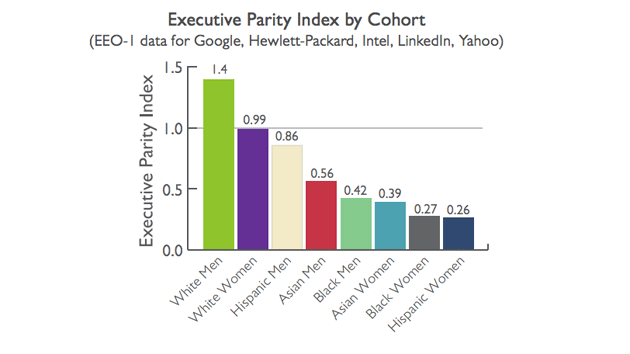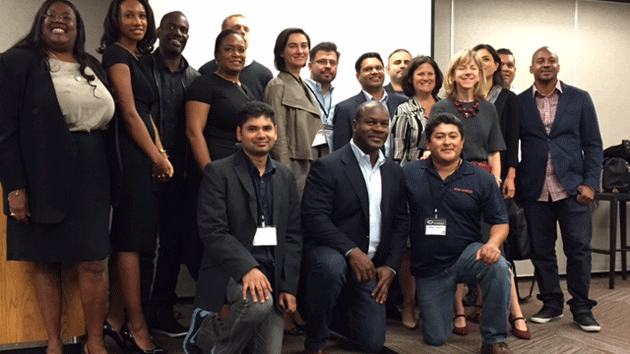
When people talk about the need for diversity in tech, they aren’t usually talking about Asian Americans. Though they make up less than 6 percent of the overall workforce, Asians account for a whopping 17 percent of all tech-sector workers and a far higher percentage of engineers. (At Twitter, for instance, people of Asian descent hold 34 percent of the technical positions.) By focusing exclusively on the obvious need for more blacks, Latinos, and women in Silicon Valley, however, diversity advocates have missed a key point: Asian workers are far less likely than whites to end up in the leadership ranks.
According to a study that the nonprofit Ascend Foundation released last week, white workers are two and a half times more likely then their Asian counterparts to serve as executives at major tech companies. The study, which examined the workforce demographics at Google, HP, Intel, LinkedIn, and Yahoo, found that the “Asian effect” was nearly four times greater than gender as a glass-ceiling factor. (The authors also pointed to leadership gaps for blacks and Latinos, but dismissed those results as less statistically significant, given how few blacks and Latinos are employed by the industry overall.)
The finding for Asians is notable, among other reasons, for what it says about the case of Ellen Pao, whose unsuccessful sex discrimination case against her former employer, the VC firm Kleiner Perkins Caufield & Byers, obsessed the technology press. Though the particulars of her case are unique, the study suggests that Pao, as an Asian American, was 40 percent as likely as a white woman and 28 percent as likely as a white man to land in a leadership role.
The “bamboo ceiling,” as author Jane Hyun terms it, is hardly limited to technology, but its existence in a sector where Asians are thriving illustrates the intractability of the problem. Hyun blames the workers for the promotion gap, arguing that they need to take a page from Sheryl Sandberg and “lean in.” But other observers, such as Lisa Lee, a senior diversity manager for Pandora, point to the need for companies to curb their preconceptions about who will make a good leader.
“Asians and Asian Americans are generally stereotyped as being nonconfrontational or timid,” says Lee, the former publisher of Hyphen, a magazine about the Asian-American experience. “So they may be overlooked for leadership roles because they’re not thought of as leadership material. This has nothing to do with their actual skills or abilities. Part of the solution is companies making a concerted effort to address bias in the promotion process to ensure it’s more fair for everyone.”
There may be additional factors at play. Mario Lugay, a program officer at the Kapor Center for Social Impact, which advocates for diversity in tech, makes the point that non-Asians are quick to lump Asians into one category, whereas Silicon Valley, for example, includes economically disadvantaged Southeast Asians and foreign-born workers from a variety of cultures. “My hope is that we strive to research and address the nuances of underrepresentation,” says Lugay, who is Filipino. “That includes the diversity within the category of Asian, as well as Asian Americans.”


















